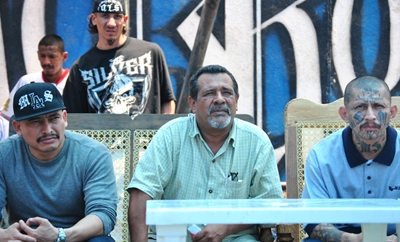The US has unexpectedly imposed financial sanctions against street gang MS-13 that has branches across the US and Central America, which could have more to do with pressuring the gang leadership to make peace in Salvador than with hurting its financial operations.
The designation, announced by the Treasury Department on October 11, allows US authorities to freeze assets of gang members in US territory, and makes it illegal for US citizens to do business with them. The orginal list of just four transnational organizations designated under a 2011 law included the Mexican Zetas and the Japanese Yakuza, and is targeted at attacking the “economic power” of these organizations.
The presence of MS-13 on the list alongside these organizations is a little incongruous. The Zetas, for example, are one of the most powerful criminal organizations in Latin America, running international drug trafficking operations and controlling all criminal activities in territories under their control. As well as operating out of Guatemala, they have financial structures in the United States, as revealed by last year’s bust of a horse racing business that was allegedly laundering vast sums of money for the group.
MS-13, by contrast, is a true street gang, which operates in the neighborhoods and prisons of the United States, El Salvador, Honduras, Guatemala and Mexico. Though it is spread over far more countries than the Zetas, it is highly decentralized and divided into different groups or “cliques” which often have little communication with each other, even within the same country.
The Treasury’s press release states that MS-13 is involved in “transnational criminal activities” including drug trafficking, human smuggling, and extortion. However, it is far from clear that the group is seriously involved in moving drugs across borders. Individual cliques may be contracted by transnational drug traffickers to carry out contract killings, or protect and store a drug shipment, but they do not run these operations themselves. As InSight Crime found in an investigation last year, the “mara” members are generally viewed by these bigger groups as disposable personnel who do not have the training or discipline to fit into their organized and hierarchical structures.
The MS-13’s cliques derive their income above all from extortion at the local level, charging “taxes” from small businesses, bus drivers, and households within their territory. Salvadoran police have estimated that the country’s imprisoned gang members make some $9.6 million a year from extortion. This is in contrast to a recently captured Zetas leader known as “El Taliban,” who claimed to the authorities that he had been taking in $30 million a month, 70 percent of which was spent on the running costs of the business. Samuel Logan of Southern Pulse told InSight Crime that the MS-13 is not a very sophisticated organization, whose members simply “take what they can get,” without well-developed structures for accounting or money laundering.
It is not clear, then, that the US’s financial sanctions against the group will damage its operations in Central America, which are small scale and localized. The funds of most cliques probably do not pass into the financial system — an accounts book reportedly belonging to one structure in San Miguel, Salvador, showed income of some $200 a week from extorting bus drivers, some of which was then paid out again for members’ bus fares and to their families. Douglas Farah of the International Assessment and Strategy Center told InSight Crime that the designation was unlikely to have much impact in Central America, because “the ‘homies’ in Salvador have no real assets in the US.”
For Logan, while the designation is unlikely to have a major impact on the gang’s operations in El Salvador, MS-13’s international connections cannot be discounted. Though the MS-13 as a whole functions as a loose, non-hierarchical network, the cliques have a strong pyramid structure within themselves, he pointed out. This allows for significant international transfers of money within each clique structure. The Treasury designation also highlights this aspect, saying that the US-based branches of the MS-13 follow orders from Salvador and send money back there.
Likewise, a recent InSight Crime investigation on the group’s US activities, published to coincide with the designation, found that there are significant transfers of money from US-based cliques to Salvador, with one Maryland police gang unit official reporting that East Coast cliques often base their actions on orders from El Salvador.
Even if it does not have a major impact on the MS-13’s finances, the designation could help the Salvadoran government in its dealings with the group. MS-13’s Salvadoran branch are currently in the midst of a deal with the government, in which they and rival gang Barrio 18 have cut killings in exchange for concessions such as lower-security prisons. It’s possible that this had something to do with the Obama administration’s decision to act against the group, and that the United States is trying to place more pressure on the gang leaders to give concessions to the Salvadoran government and maintain the current peace.
Salvadoran officials, meanwhile, said that the designation would have no effect on the truce, while one of its main brokers, Raul Mijango (pictured), told La Pagina that they were not surpirsed by the designation. “Nobody has denied that it is a criminal structure, but we are working so that it will stop being one. We are on the way.”

